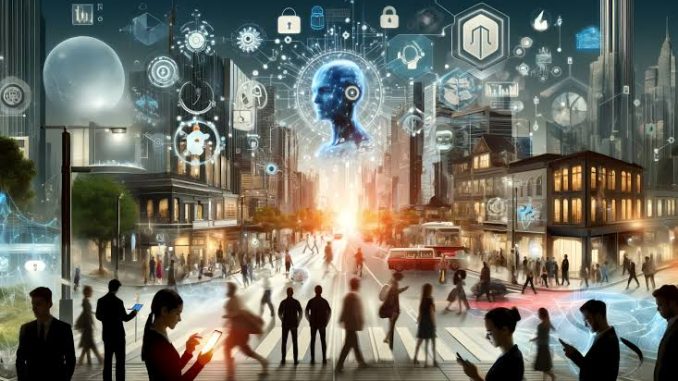
1. Artificial Intelligence and Human Augmentation
Artificial intelligence (AI) is poised to continue reshaping industries and daily life. In the coming years, AI will move beyond automating routine tasks to becoming a collaborative partner for creativity, problem-solving, and decision-making. Generative AI, in particular, is set to revolutionize fields such as education, healthcare, and the arts by offering personalized solutions and creative support.
Human augmentation, powered by AI and advanced biotechnology, could also become more mainstream. Wearable devices, brain-computer interfaces, and bioengineering advancements may enhance human capabilities, blurring the lines between technology and biology. However, these innovations will require addressing ethical questions about accessibility, equity, and the boundaries of human enhancement.
2. The Rise of Green Technology
As the world grapples with climate change, the next decade will see a surge in green technologies aimed at achieving sustainability. Renewable energy sources like solar, wind, and hydrogen will become more efficient and widespread, transforming energy systems globally. Advances in battery technology will enhance energy storage, making renewable power more reliable and accessible.
Smart cities will play a crucial role in reducing carbon footprints through technologies such as energy-efficient buildings, smart grids, and sustainable urban planning. Innovations in materials science, such as biodegradable plastics and carbon capture technologies, will further contribute to environmental preservation.
3. The Evolution of Work in the Digital Age
The workplace of the future will be shaped by digital tools, remote collaboration, and a growing emphasis on work-life balance. Technologies like virtual reality (VR) and augmented reality (AR) will create immersive workspaces, enabling seamless collaboration across borders. Automation and AI will continue to streamline operations, but this will also demand a reskilling revolution to equip workers with the tools needed to thrive in a technology-driven economy.
Hybrid work models will become the norm, with companies leveraging technology to foster inclusivity and productivity. However, these shifts will necessitate addressing issues such as digital fatigue, cybersecurity, and the digital divide.
4. The Expansion of the Metaverse
The metaverse—a network of interconnected virtual spaces—has the potential to transform how people interact, socialize, and conduct business. Over the next decade, the metaverse will likely evolve into a dynamic ecosystem, integrating VR, AR, blockchain, and AI technologies.
This digital realm will create opportunities for virtual economies, decentralized social networks, and immersive education platforms. However, as the metaverse becomes a larger part of daily life, it will raise concerns about privacy, security, and the potential for digital addiction.
5. The Future of Health and Well-being
The healthcare sector will undergo a dramatic transformation as technology advances. Precision medicine, enabled by AI and genomic research, will offer personalized treatment plans based on an individual’s genetic makeup and health data. Telemedicine will become more sophisticated, allowing patients to access high-quality care from anywhere in the world.
Wearable health devices and AI-powered diagnostics will empower individuals to take proactive control of their health. At the same time, advancements in biotechnology and regenerative medicine will open new possibilities for curing previously untreatable conditions. These innovations, however, will demand careful regulation and ethical oversight to ensure equitable access.
6. Ethics and the Regulation of Technology
As technology becomes more intertwined with everyday life, ethical and regulatory frameworks will need to evolve rapidly. Issues such as data privacy, algorithmic bias, and misinformation will remain pressing concerns. Governments, corporations, and civil society must collaborate to develop policies that balance innovation with accountability and fairness.
Technological advancements will also raise profound philosophical questions about identity, autonomy, and what it means to be human. The development of frameworks to address these questions will be critical in ensuring technology serves humanity’s best interests.
7. Education and Lifelong Learning
In a world of rapid technological change, education will need to adapt to prepare individuals for the future. The integration of AI and digital tools in education will enable personalized learning experiences tailored to students’ needs. Skills such as critical thinking, creativity, and adaptability will become increasingly important in a technology-driven economy.
Lifelong learning will take center stage as individuals continuously upskill to keep pace with evolving industries. Online platforms and micro-credentialing systems will play a key role in making education more accessible and flexible.
Conclusion
The next decade will be a pivotal period in the relationship between technology and society. While the opportunities for progress are immense, so are the challenges of ensuring that technological advancements benefit all members of society. By fostering collaboration, ethical innovation, and a commitment to inclusivity, we can shape a future where technology enhances human potential and addresses global challenges. The choices we make today will determine whether this intersection of technology and society leads to a brighter tomorrow.